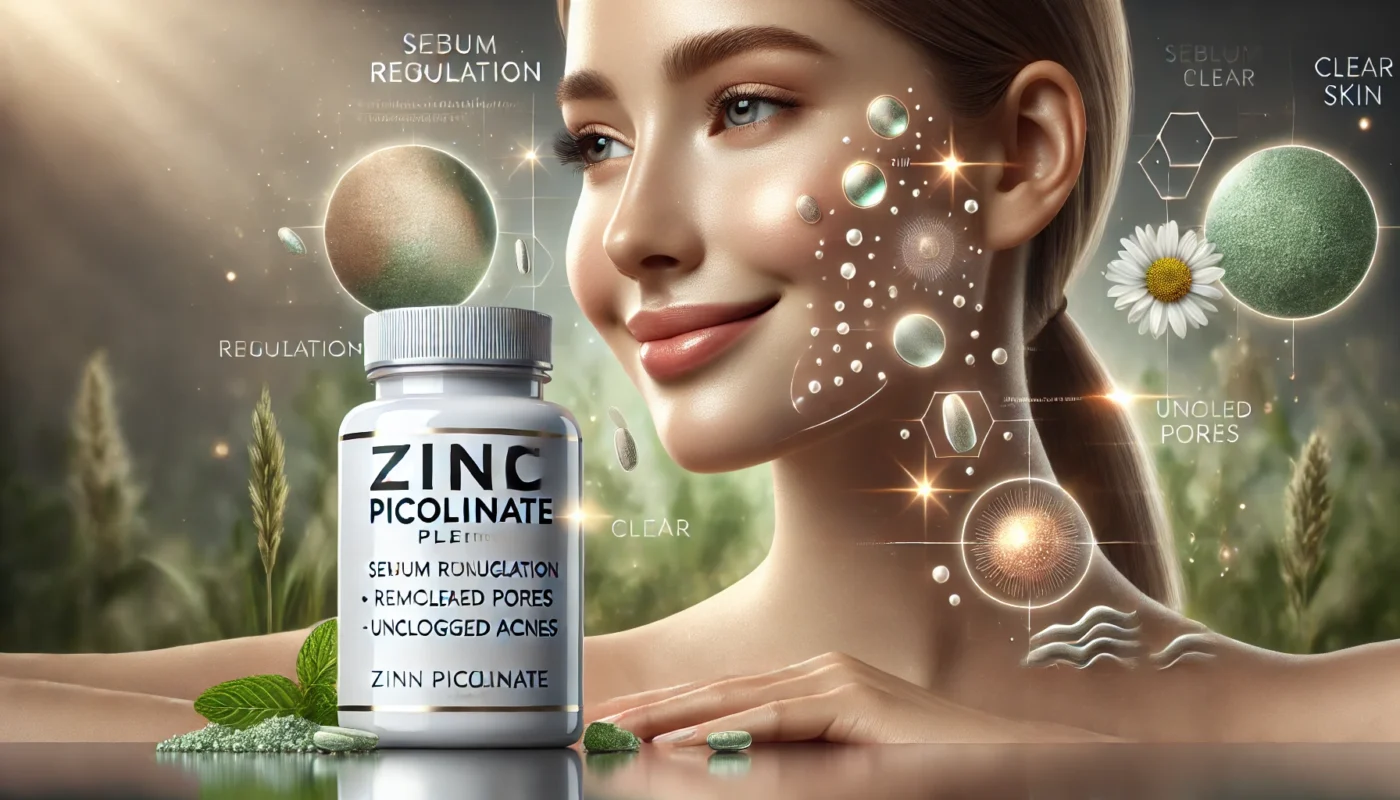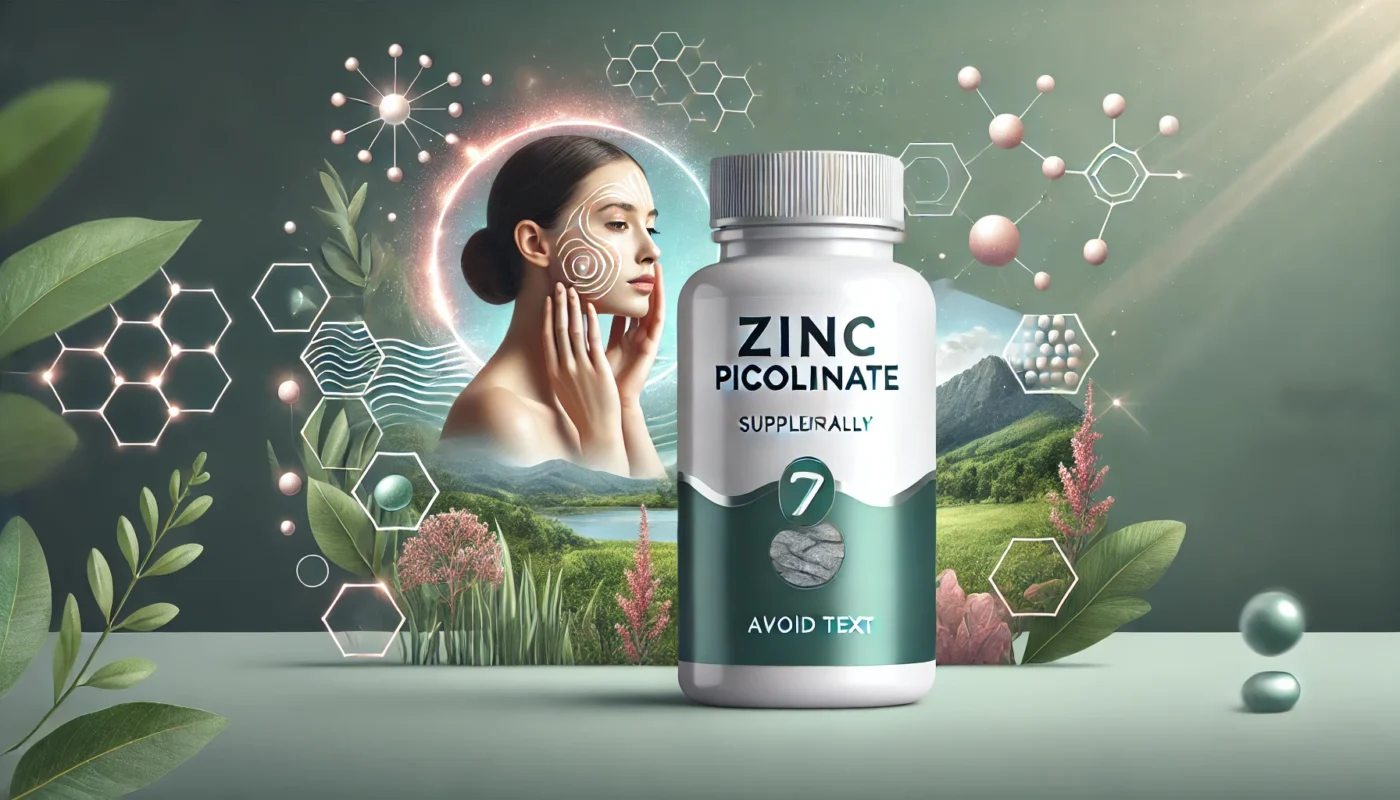Rosacea is a chronic skin condition characterized by facial redness, visible blood vessels, and recurrent flare-ups of inflammation. It affects an estimated 5–10% of the global population, with symptoms often triggered by stress, environmental factors, and certain foods. While treatments like topical antibiotics, laser therapies, and prescription medications can manage symptoms, they may come with side effects or limited long-term benefits.
Emerging research highlights the role of zinc, particularly zinc picolinate, in managing rosacea naturally. Zinc picolinate, a highly bioavailable form of zinc, offers significant benefits for reducing inflammation, calming irritation, and promoting skin healing. This article explores the science behind zinc picolinate’s potential to manage rosacea symptoms, soothe flare-ups, and improve overall skin health.
You May Also Like:
Zinc Picolinate for Clear Pores: The Ultimate Acne Solution
Zinc Picolinate and Sensitive Skin: A Gentle Solution
Zinc Picolinate and Rosacea: Managing Flare-Ups Naturally is an original (HSLHealing) article.
Understanding Rosacea and Its Triggers
Rosacea is a multifactorial condition involving a combination of genetic, environmental, and immunological factors. It primarily affects adults between 30 and 50 years old and is more common in fair-skinned individuals. While the exact cause of rosacea remains unknown, its symptoms are driven by inflammation and vascular dysregulation.
Common Symptoms:
- Persistent facial redness (erythema)
- Visible blood vessels (telangiectasia)
- Flushing and sensitivity
- Bumps or acne-like pustules
- Eye irritation (ocular rosacea)
Triggers That Exacerbate Skin Inflammation:
- Stress and anxiety
- Sun exposure
- Hot or spicy foods
- Alcohol
- Certain skincare products
Why Zinc Is Essential for Skin Health
Zinc is an essential trace mineral involved in numerous biological processes that are critical for maintaining healthy skin. Its benefits include:
- Anti-Inflammatory Properties:
Zinc reduces the production of pro-inflammatory cytokines, calming redness and irritation. - Immune Regulation:
Zinc modulates the immune system, preventing overactive responses that can exacerbate rosacea. - Antioxidant Protection:
Zinc acts as a cofactor for antioxidant enzymes, reducing oxidative stress that damages skin cells. - Skin Barrier Support:
Zinc promotes the production of keratin and collagen, strengthening the skin’s natural barrier. - Antimicrobial Effects:
Zinc inhibits the growth of certain bacteria and microorganisms, such as Demodex mites, which are implicated in some cases.

What Is Zinc Picolinate?
Zinc picolinate is a chelated form of zinc, in which zinc is bound to picolinic acid. This form enhances zinc’s absorption in the gastrointestinal tract, ensuring efficient delivery to target tissues such as the skin. For individuals seeking to manage rosacea, zinc picolinate provides an effective means of addressing zinc deficiencies and supporting overall skin health.
How Zinc Picolinate Helps Manage Rosacea
1. Reducing Inflammation and Redness
Inflammation plays a central role in rosacea, driving redness, swelling, and irritation. Zinc picolinate’s anti-inflammatory properties help modulate the production of pro-inflammatory molecules like interleukin-6 (IL-6) and tumor necrosis factor-alpha (TNF-α).
- Study Insight: Research published in Dermatologic Therapy found that zinc supplementation significantly reduced inflammation and redness in individuals with mild to moderate rosacea.
2. Calming Skin Irritation
Rosacea-prone skin is highly sensitive to external triggers. Zinc picolinate soothes irritation by stabilizing mast cells, which release histamines during inflammatory responses.
- Clinical Evidence: A study in Journal of Clinical and Aesthetic Dermatology reported that zinc reduced sensitivity and irritation in patients with rosacea, particularly when combined with gentle skincare routines.
3. Protecting Against Oxidative Stress
Oxidative stress from sun exposure and pollution exacerbates rosacea symptoms. Zinc picolinate acts as an antioxidant, neutralizing free radicals and protecting skin cells from damage.
- Research Finding: A study in Free Radical Biology and Medicine highlighted that zinc supplementation increased antioxidant enzyme activity, reducing oxidative stress markers in individuals with inflammatory skin conditions.
4. Regulating Sebum Production
Some rosacea subtypes involve pustules and oily skin. Zinc picolinate helps regulate sebum production, reducing the appearance of pustules and preventing clogged pores.
- Evidence: A clinical trial in Acta Dermatovenerologica showed that zinc supplementation improved pustular rosacea symptoms by reducing excess sebum and inflammation.
5. Supporting Skin Healing and Barrier Repair
Rosacea flare-ups can damage the skin barrier, leading to dryness and increased sensitivity. Zinc picolinate promotes the synthesis of collagen and keratin, aiding in skin repair and barrier restoration.
- Study Insight: Research in Advances in Wound Care found that zinc supplementation accelerated wound healing and improved barrier function in individuals with compromised skin.
6. Combating Demodex Mites
Overgrowth of Demodex mites, a common skin microorganism, has been implicated in some cases. Zinc picolinate’s antimicrobial properties help inhibit their proliferation, reducing associated symptoms.
- Clinical Evidence: A study in Parasitology Research demonstrated that zinc-based treatments reduced Demodex mite populations and improved rosacea symptoms.

Zinc Deficiency and Rosacea
Zinc deficiency is associated with a higher risk of inflammatory skin conditions. Factors such as poor dietary intake, stress, and chronic inflammation can exacerbate zinc depletion, worsening symptoms.
Signs of Zinc Deficiency:
- Persistent skin inflammation
- Slow wound healing
- Increased skin sensitivity
- Frequent infections
Statistics:
- A study in Journal of Nutrition found that up to 30% of individuals with chronic inflammatory skin conditions are zinc-deficient.
- Zinc deficiency is more common in populations with restricted diets, such as vegetarians or individuals with malabsorption issues.
Dietary Sources of Zinc
While zinc picolinate supplementation is effective, dietary sources of zinc can contribute to overall intake. Examples include:
- Animal-Based Sources: Oysters, beef, chicken, turkey, eggs.
- Plant-Based Sources: Pumpkin seeds, lentils, chickpeas, quinoa, fortified cereals.
Note: For individuals with rosacea, who may require higher zinc levels, zinc picolinate offers a reliable and efficient supplementation option.
Recommended Dosage and Safety
The recommended dietary allowance (RDA) for zinc is:
- Adult men: 11 mg/day
- Adult women: 8 mg/day
For managing rosacea, therapeutic doses of zinc picolinate typically range from 15–30 mg/day. Excessive zinc intake (above 40 mg/day) can lead to:
- Nausea
- Reduced copper absorption
- Gastrointestinal discomfort
Note: Always consult with a healthcare provider before starting supplementation to determine the appropriate dosage and ensure safety.

Tips for Incorporating Zinc Picolinate Into a Rosacea Management Plan
- Combine With a Gentle Skincare Routine: Use non-comedogenic, fragrance-free products to minimize irritation and enhance zinc’s benefits.
- Stay Hydrated: Adequate hydration supports skin barrier function and helps reduce redness.
- Adopt a Rosacea-Friendly Diet: Avoid common triggers like spicy foods, alcohol, and processed sugar while incorporating anti-inflammatory foods like green tea, fatty fish, and leafy greens.
- Protect Against UV Exposure: Use zinc oxide-based sunscreens to shield your skin from the sun, a common rosacea trigger.
Future Research Directions
While current studies support zinc picolinate’s benefits for rosacea, further research could explore:
- Long-term effects of zinc supplementation on rosacea progression.
- Synergistic effects of zinc with other natural anti-inflammatories, such as niacinamide or green tea extract.
- Zinc’s role in managing specific rosacea subtypes, such as ocular rosacea.
Conclusion: Zinc Picolinate for Rosacea Management
Zinc picolinate offers a science-backed, natural solution for managing rosacea symptoms. By reducing inflammation, calming irritation, and promoting skin healing, zinc picolinate addresses the root causes of flare-ups while supporting overall skin health.
For individuals seeking an effective and well-tolerated approach to rosacea management, incorporating zinc picolinate into a comprehensive skincare and wellness plan can provide significant benefits. As always, consult with a healthcare provider to tailor supplementation to your specific needs and ensure safe and effective use.

References
- Oral zinc sulfate in the treatment of rosacea: a double-blind, placebo-controlled study. Retrieved from: https://pubmed.ncbi.nlm.nih.gov/16863527/
- Trace element zinc and skin disorders. Retrieved from: https://www.frontiersin.org/journals/medicine/articles/10.3389/fmed.2022.1093868/full
- Zinc Therapy in Dermatology: A Review. Retrieved from: https://pmc.ncbi.nlm.nih.gov/articles/PMC4120804/
- Effects of Zinc Supplementation on Inflammatory Skin Diseases: A Systematic Review of the Clinical Evidence. Retrieved from: https://www.researchgate.net/publication/337365474_Effects_of_Zinc_Supplementation_on_Inflammatory_Skin_Diseases_A_Systematic_Review_of_the_Clinical_Evidence
- The effect of zinc supplementation on pro-inflammatory cytokines (TNF-α, IL-1 AND IL-6) in mice with Escherichia coli LPS-induced diarrhea. Retrieved from: https://pmc.ncbi.nlm.nih.gov/articles/PMC7049316/
Important Note: The information contained in this article is for general informational purposes only, and should not be construed as health or medical advice, nor is it intended to diagnose, prevent, treat, or cure any disease or health condition. Before embarking on any diet, fitness regimen, or program of nutritional supplementation, it is advisable to consult your healthcare professional in order to determine its safety and probable efficacy in terms of your individual state of health.
Regarding Nutritional Supplements Or Other Non-Prescription Health Products: If any nutritional supplements or other non-prescription health products are mentioned in the foregoing article, any claims or statements made about them have not been evaluated by the U.S. Food and Drug Administration, and such nutritional supplements or other health products are not intended to diagnose, treat, cure, or prevent any disease.

